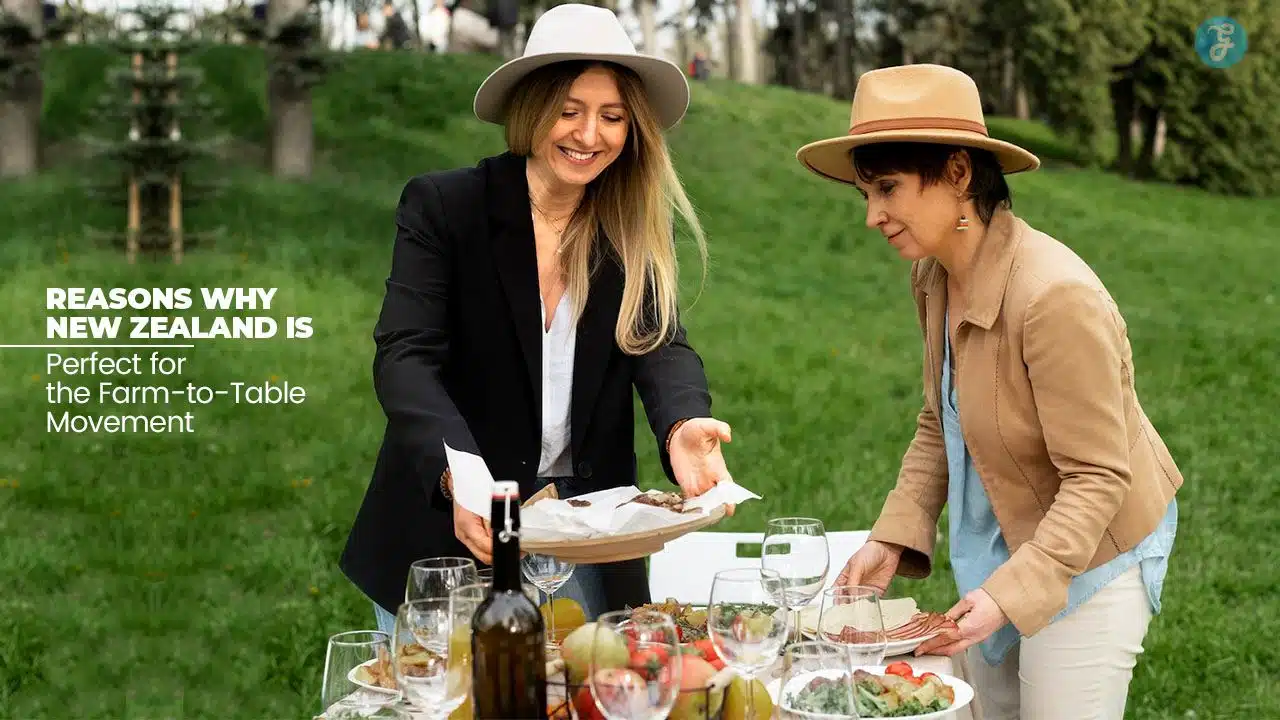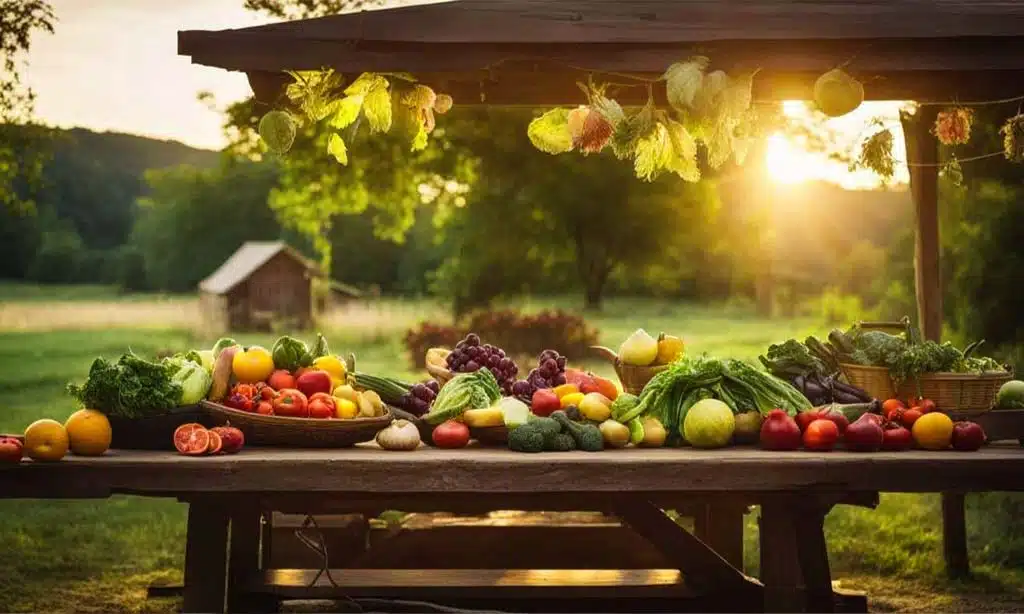New Zealand has earned global recognition for its breathtaking landscapes, clean air, and fresh, locally grown produce. It’s no surprise that the farm-to-table movement thrives in this island nation.
The concept of farm to table in New Zealand highlights the country’s dedication to sustainability and local cuisine.
In this article, we’ll explore 15 compelling reasons why New Zealand is perfect for the farm-to-table movement, diving into its rich agricultural heritage, pristine resources, and innovative practices.
1. The Farm-to-Table Concept in New Zealand
Farm-to-table means delivering food directly from local farms to dining tables, minimizing processing and transportation. In New Zealand, this concept aligns naturally with the country’s agricultural roots and sustainability efforts. Many farmers collaborate with chefs and restaurants to offer fresh, seasonal dishes.
| Key Aspects | Details |
| Definition | Food sourced directly from farms, reducing intermediaries. |
| Practices | Seasonal menus, minimal processing, and reduced food miles. |
| Example | Local farmers’ markets like Otago Farmers Market. |
2. Ideal Climate for Year-Round Agriculture
New Zealand’s mild climate allows for year-round farming. Its temperate weather ensures a consistent supply of fresh produce, from kiwifruit in the north to hardy root vegetables in the south.
| Region | Crops |
| Northland | Kiwifruit, avocados, and citrus fruits. |
| Canterbury | Wheat, barley, and potatoes. |
| Otago | Apples, cherries, and apricots. |
This variety ensures that New Zealand’s restaurants and homes always have fresh, local options.
3. Rich Agricultural Heritage
Agriculture has been a cornerstone of New Zealand’s economy for centuries. Farmers have honed their techniques, blending traditional knowledge with modern practices to meet the growing demand for quality, local food.
| Historical Highlights | Significance |
| Sheep farming in the 1800s | Helped establish the nation’s economy. |
| Export of dairy and meat | Major contributor to GDP. |
| Introduction of agritech | Enhanced efficiency and sustainability. |
4. Commitment to Sustainability
Sustainability is at the heart of New Zealand’s farm-to-table movement. Farmers employ eco-friendly practices like crop rotation, organic farming, and reduced pesticide use to protect the environment.
| Practice | Benefit |
| Organic farming | Healthier produce, less pollution. |
| Water conservation methods | Protects natural water resources. |
| Carbon footprint reduction | Supports climate action. |
5. Strong Farm-to-Chef Relationships
Local chefs in New Zealand work closely with farmers to create seasonal menus that celebrate local produce. This collaboration strengthens the farm-to-table philosophy and enhances the dining experience.
| Farm-to-Chef Example | Details |
| Riverstone Kitchen, Oamaru | Uses produce from their own farm. |
| Roots Restaurant, Lyttelton | Features hyper-local, seasonal menus. |
| Gatherings, Christchurch | Focuses on sustainable ingredients. |
6. Access to Pristine Natural Resources
New Zealand’s unspoiled natural resources—clean water, fertile soil, and fresh air—ensure that its produce is of the highest quality. These pristine conditions are ideal for growing nutrient-rich fruits, vegetables, and grains.
| Resource | Impact |
| Clean water | Produces flavorful crops. |
| Fertile soil | Supports diverse farming. |
| Fresh air | Ensures healthy livestock. |
7. Diverse Range of Produce and Livestock
From juicy fruits to premium dairy, New Zealand’s range of produce is unmatched. It’s also famous for grass-fed lamb and sustainably farmed seafood.
| Category | Examples |
| Fruits | Apples, kiwifruit, cherries. |
| Dairy | Cheese, butter, yogurt. |
| Meat and seafood | Lamb, venison, green-lipped mussels. |
8. Thriving Local Markets and Food Festivals
Farmers’ markets and food festivals celebrate New Zealand’s local produce and culinary heritage. These events connect farmers with consumers and promote farm-to-table values.
| Market/Event | Highlights |
| Otago Farmers Market | Seasonal produce, artisanal goods. |
| Hawke’s Bay Farmers Market | Fresh fruits, wine, and baked goods. |
| Wellington On a Plate | Showcases local food and beverages. |
9. Supportive Government Policies
New Zealand’s government actively promotes sustainable farming through grants, education, and certification programs. Policies focus on reducing environmental impact and encouraging local consumption.
| Policy | Impact |
| Sustainable Farming Fund | Supports eco-friendly projects. |
| Organic Certification Program | Encourages organic farming. |
| Biosecurity Measures | Protects local agriculture. |
10. Globally Renowned Culinary Scene
New Zealand is home to world-class chefs and restaurants that embrace the farm-to-table philosophy. This reputation attracts culinary tourists eager to experience fresh, local cuisine.
| Restaurant | Specialty |
| Amisfield, Queenstown | Seasonal tasting menus. |
| Pacifica, Napier | Seafood-focused dishes. |
| The French Café, Auckland | Innovative farm-to-table creations. |
11. Innovation in Agritech
New Zealand’s adoption of agritech enhances its farm-to-table movement. Tools like precision farming and smart irrigation systems improve efficiency and reduce waste.
| Technology | Benefit |
| Drones | Monitor crops efficiently. |
| Soil sensors | Optimize water and fertilizer use. |
| Blockchain tracking | Ensures transparency in food sourcing. |
12. Community Support and Awareness
New Zealanders value fresh, local food and actively support farmers’ markets and farm-to-table restaurants. This cultural pride fuels the movement’s success.
| Aspect | Details |
| Consumer preference | High demand for local produce. |
| Educational campaigns | Promote benefits of farm-to-table. |
| Community initiatives | Encourage sustainable eating habits. |
13. Export-Quality Produce for Local Consumption
New Zealand’s top-quality exports—like its renowned dairy products and wines—are also available for local consumption, ensuring a high standard of fresh food.
| Exported Product | Local Use |
| Sauvignon Blanc wines | Popular in both local and global markets. |
| Grass-fed beef and lamb | Widely consumed domestically. |
| Dairy products | Found in supermarkets nationwide. |
14. Tourism Meets Farm-to-Table
Tourism in New Zealand often includes agritourism, offering visitors farm stays, vineyard tours, and food trails that highlight the farm-to-table experience.
| Experience | Details |
| Farm stays | Hands-on farm experiences for tourists. |
| Vineyard tours | Wine tasting paired with local food. |
| Food trails | Explore regions through local cuisine. |
15. Farm to Table in New Zealand: A Perfect Fit
New Zealand’s rich agricultural heritage, pristine resources, and commitment to sustainability make it an ideal leader in the global farm-to-table movement.
The emphasis on farm to table in New Zealand is evident in its thriving markets, innovative farming practices, and world-class culinary scene. Whether you’re visiting farmers’ markets or dining at acclaimed restaurants, the focus on fresh, local, and sustainable food is unmistakable.
Takeaway
New Zealand’s dedication to the farm-to-table movement is more than just a trend—it’s a way of life that resonates with locals and visitors alike. By prioritizing sustainability, fostering strong relationships between farmers and chefs, and embracing agritech innovations, New Zealand sets a global example of how food should be grown, shared, and enjoyed.
Whether you’re savoring a meal crafted from ingredients sourced just miles away or exploring bustling farmers’ markets, the spirit of farm to table in New Zealand shines through every bite. For food lovers and sustainability enthusiasts, New Zealand is not just a destination—it’s an inspiration.




































